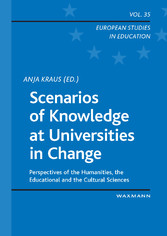Suchen und Finden
Service
Mehr zum Inhalt

Scenarios of Knowledge at Universities in Change - Perspectives of the Humanities, the Educational and the Cultural Sciences
Book Cover
1
Imprint
4
Contents
5
Introduction: Perspectives of the Humanities, the Educational and the Cultural Sciences on University (Anja Kraus)
7
The Ethos of Gratitude. To the Non-Utilitarian Grounds of University Education (Tatiana Shchyttsova)
13
The German University as an Educational Institution. Analyses of its Historical, Current, and Future Development (Carola Groppe)
25
Introduction
25
The Institutional Identity of the “Classical University”
26
Educational Institutions, Institutional Fictions, and Education through Science
28
20th Century Problems of the Germany University: the Problem of Masses, and “Education” through Final Exams
30
The University as Subject of Educational Science
38
References
43
University as Knowledge Scenario. Bildung and Sustainability (Anja Kraus)
49
University as a Topic of Research
49
Scenarios of Knowledge in the Sign of Bildung: University and Vision
50
Scenarios of Knowledge as Bildung – a Challenge
51
Higher Education for Sustainable Development
55
References
57
Dark Pedagogy 4.0: Art as a School Subject in the Wake of Competence Orientation and Digitalization (Pierangelo Maset)
61
Control and Predictability
62
Competences over Education
64
“Digi in the Valley” (Digi im Tal)
66
References
67
Qualities of Academic Education – A Comparison of Discussions and Positionings in Sweden and Germany (Anja Kraus)
69
Abstract
69
Quality as an Aim
69
Fundamental Considerations on the Comparison of the Ideas of Quality in Educational Institutions in Sweden and Germany
72
Common Starting Point
73
Historical and Cultural Differences in Sweden and Germany
74
Discourse-based Differences
78
Conclusion
80
References
81
Investigations into Body Language. How to Advance Queer Intersectional Learning within Art Education (Nanna Lüth)
87
The Body in Phenomenology
88
Queering Phenomenology
89
Black Feminist Pedagogy as a Practice of Freedom
90
“Media Change (Body)”
91
“Female” and “Male” Body Language as a Result of Patriarchal Structures
92
In the Chair Round
94
On Objectivity
96
Queering the Chair Round / Unlearning Cis-Privilege
97
Undoing Colorblindness
100
Sexual Voids
102
Conclusion
103
References
105
Values and Knowledge Education (VaKE) – a Didactic Tool to Teach Humanism and Democracy (Jean-Luc Patry)
109
Introduction
109
Values Education
109
Dilemma “Teaching about colonialism”
111
Values and Knowledge Education (VaKE)
113
Some Results of Studies with VaKE
117
Education for Humanism and Democracy
120
References
122
Authors
127
Alle Preise verstehen sich inklusive der gesetzlichen MwSt.







